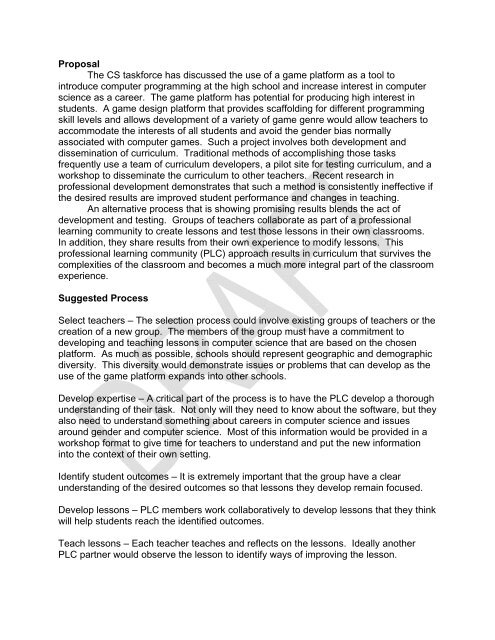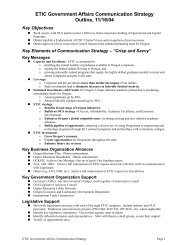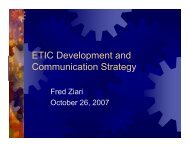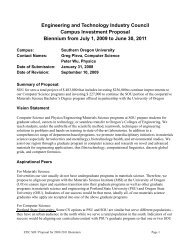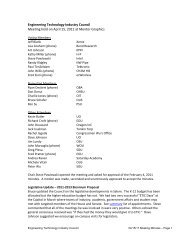Proposal for a Professional Learning Community development of ...
Proposal for a Professional Learning Community development of ...
Proposal for a Professional Learning Community development of ...
Create successful ePaper yourself
Turn your PDF publications into a flip-book with our unique Google optimized e-Paper software.
<strong>Proposal</strong><br />
The CS task<strong>for</strong>ce has discussed the use <strong>of</strong> a game plat<strong>for</strong>m as a tool to<br />
introduce computer programming at the high school and increase interest in computer<br />
science as a career. The game plat<strong>for</strong>m has potential <strong>for</strong> producing high interest in<br />
students. A game design plat<strong>for</strong>m that provides scaffolding <strong>for</strong> different programming<br />
skill levels and allows <strong>development</strong> <strong>of</strong> a variety <strong>of</strong> game genre would allow teachers to<br />
accommodate the interests <strong>of</strong> all students and avoid the gender bias normally<br />
associated with computer games. Such a project involves both <strong>development</strong> and<br />
dissemination <strong>of</strong> curriculum. Traditional methods <strong>of</strong> accomplishing those tasks<br />
frequently use a team <strong>of</strong> curriculum developers, a pilot site <strong>for</strong> testing curriculum, and a<br />
workshop to disseminate the curriculum to other teachers. Recent research in<br />
pr<strong>of</strong>essional <strong>development</strong> demonstrates that such a method is consistently ineffective if<br />
the desired results are improved student per<strong>for</strong>mance and changes in teaching.<br />
An alternative process that is showing promising results blends the act <strong>of</strong><br />
<strong>development</strong> and testing. Groups <strong>of</strong> teachers collaborate as part <strong>of</strong> a pr<strong>of</strong>essional<br />
learning community to create lessons and test those lessons in their own classrooms.<br />
In addition, they share results from their own experience to modify lessons. This<br />
pr<strong>of</strong>essional learning community (PLC) approach results in curriculum that survives the<br />
complexities <strong>of</strong> the classroom and becomes a much more integral part <strong>of</strong> the classroom<br />
experience.<br />
Suggested Process<br />
Select teachers – The selection process could involve existing groups <strong>of</strong> teachers or the<br />
creation <strong>of</strong> a new group. The members <strong>of</strong> the group must have a commitment to<br />
developing and teaching lessons in computer science that are based on the chosen<br />
plat<strong>for</strong>m. As much as possible, schools should represent geographic and demographic<br />
diversity. This diversity would demonstrate issues or problems that can develop as the<br />
use <strong>of</strong> the game plat<strong>for</strong>m expands into other schools.<br />
Develop expertise – A critical part <strong>of</strong> the process is to have the PLC develop a thorough<br />
understanding <strong>of</strong> their task. Not only will they need to know about the s<strong>of</strong>tware, but they<br />
also need to understand something about careers in computer science and issues<br />
around gender and computer science. Most <strong>of</strong> this in<strong>for</strong>mation would be provided in a<br />
workshop <strong>for</strong>mat to give time <strong>for</strong> teachers to understand and put the new in<strong>for</strong>mation<br />
into the context <strong>of</strong> their own setting.<br />
Identify student outcomes – It is extremely important that the group have a clear<br />
understanding <strong>of</strong> the desired outcomes so that lessons they develop remain focused.<br />
Develop lessons – PLC members work collaboratively to develop lessons that they think<br />
will help students reach the identified outcomes.<br />
Teach lessons – Each teacher teaches and reflects on the lessons. Ideally another<br />
PLC partner would observe the lesson to identify ways <strong>of</strong> improving the lesson.


